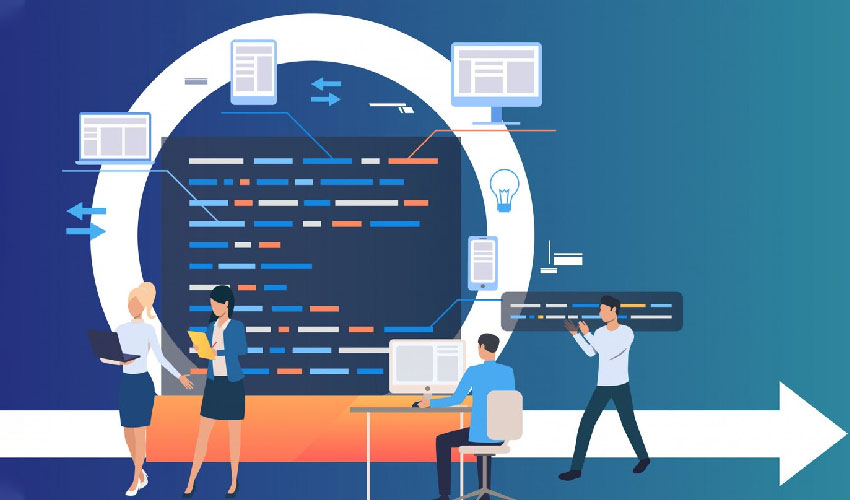Table of Contents
Introduction
In the ever-evolving landscape of mobile app development, leveraging cloud integration has become a pivotal strategy. Cloud integration refers to the seamless incorporation of cloud services into the mobile app development process. It plays a vital role in enhancing efficiency, reducing costs, and ensuring optimal performance throughout the app’s lifecycle.
Streamlining Development Process
Cloud-Based Collaboration
One of the primary advantages of cloud integration is the ability to foster collaboration among development teams. Cloud platforms provide a centralized space for developers to work simultaneously, share resources, and contribute to the project in real-time.
Real-Time Updates and Synchronization
Cloud integration enables real-time updates, ensuring that all team members have access to the latest version of the app. Synchronization across devices and locations facilitates a smooth and efficient development process.
Cost Efficiency
Reduced Infrastructure Costs
Traditional app development often involves substantial upfront infrastructure costs. Cloud integration allows developers to leverage cloud resources, eliminating the need for significant hardware investments.
Pay-as-You-Go Model
Cloud services typically operate on a pay-as-you-go model, allowing developers to pay only for the resources they use. This cost-effective approach is especially beneficial for startups and small businesses.
Enhanced Scalability
Meeting Fluctuating Workloads
Cloud integration provides the flexibility to scale resources up or down based on the app’s demand. This scalability ensures that the app can handle varying workloads without compromising performance.
Seamless Integration with Additional Features
Developers can seamlessly integrate additional features into the app by leveraging cloud services. This flexibility enables quick adaptation to market trends and user preferences.
Improved Performance
Offloading Processing to Cloud Servers
By offloading resource-intensive tasks to cloud servers, mobile apps can achieve optimal performance on a variety of devices. This approach ensures a consistent and smooth user experience.
Optimal Resource Utilization
Cloud integration allows for the efficient utilization of computing resources. Developers can allocate resources dynamically, optimizing performance without unnecessary resource consumption.
Data Security and Compliance
Robust Cloud Security Measures
Cloud service providers implement robust security measures to protect data. This includes encryption, multi-factor authentication, and regular security updates, ensuring a secure environment for app development.
Adherence to Regulatory Standards
Cloud integration enables developers to ensure compliance with industry and regional regulatory standards. This is crucial, especially in sectors where data privacy and security are paramount.
Accessibility and Cross-Platform Compatibility
Anytime, Anywhere Access
Cloud-integrated apps offer users the advantage of accessing data and services from anywhere at any time. This accessibility enhances user convenience and satisfaction.
Consistent User Experience
Cloud integration facilitates cross-platform compatibility, ensuring a consistent user experience across different devices and operating systems. This consistency contributes to positive user feedback and app adoption.
Speedy Deployment
Rapid Testing and Deployment Cycles
Cloud-based development accelerates testing and deployment cycles. Developers can quickly test new features, implement updates, and deploy changes without prolonged downtime.
Minimized Downtime
Cloud integration minimizes downtime during updates or maintenance. Users can seamlessly access the app while updates are applied in the background, enhancing overall user satisfaction.
Collaboration and Communication
Facilitating Team Interaction
Cloud platforms provide tools for effective communication and collaboration among team members. This fosters a cohesive development environment, leading to improved productivity.
Centralized Information Hub
Cloud integration centralizes project information, making it easily accessible to all team members. This centralized hub ensures that everyone is on the same page, reducing misunderstandings and errors.
Analytics and Insights
Utilizing Cloud-Based Analytics Tools
Cloud-integrated apps can leverage advanced analytics tools to gather valuable insights into user behavior and app performance. This data-driven approach enables developers to make informed decisions.
Data-Driven Decision Making
Analyzing user data allows developers to make data-driven decisions regarding app features, updates, and improvements. This iterative approach enhances the app’s relevance and user satisfaction.
Customer Experience Enhancement
Personalization Features
Cloud integration enables the implementation of personalized features based on user preferences and behavior. This enhances the overall customer experience, fostering user loyalty.
Quick Updates and Bug Fixes
Cloud-based deployment allows for quick updates and bug fixes. Developers can address issues promptly, ensuring a smooth and reliable user experience.
Challenges of Cloud Integration
Potential Issues and Solutions
While cloud integration offers numerous benefits, it comes with its set of challenges. Addressing potential issues, such as data security concerns and integration complexities, is crucial for successful implementation.
Risk Mitigation Strategies
Developers should implement risk mitigation strategies to overcome challenges associated with cloud integration. This includes thorough testing, regular security audits, and proactive problem-solving.
Future Trends in Cloud Integration
Emerging Technologies
The future of cloud integration in mobile app development is poised to embrace emerging technologies such as edge computing, serverless architecture, and AI-driven services. Staying abreast of these trends is essential for staying competitive.
Evolving Development Practices
As technology evolves, development practices will also undergo changes. Cloud integration will likely become even more streamlined, with a focus on automation, efficiency, and improved developer experience.
Case Studies
Successful Implementations
Examining real-world case studies of successful cloud-integrated mobile apps provides valuable insights. Understanding the challenges faced and benefits gained by others can inform strategic decision-making.
Measurable Benefits
Quantifying the benefits of cloud integration through metrics such as reduced time to market, increased user engagement, and cost savings adds credibility to the argument for adoption.
Conclusion
In conclusion, the benefits of cloud integration in mobile app development are undeniable. From streamlining the development process to enhancing scalability, improving performance, and ensuring data security, cloud integration offers a comprehensive solution. As the industry continues to evolve, embracing cloud integration is not just a choice but a necessity for staying competitive and delivering high-quality mobile apps.
Thanks for reading our post “The Benefits of Cloud Integration in Mobile App Development”. Please connect with us to know more about Benefits of Cloud Integration.






















